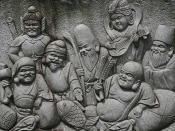Meditations is a discussion of metaphysics, or what is truly real. In these writings, he
ultimately hopes to achieve absolute certainty about the nature of everything including
God, the physical world, and himself. It is only with a clear and distinct knowledge of
such things that he can then begin understand his true reality. Descartes starts by looking
at our usual sources for truth. Authority, which is churches, parents, and schools, he says,
are not reliable sources for truth because time shows we all die, and that we are
eventually proved wrong, much in the same way the accepted truths of science have
changed dramatically over the course of history. Also, he considers the generally excepted
view that our senses dependably report the absolute nature of reality. Simiar to authority,
Descartes discards the senses as a source of truth because of the "Dream Argument" or
the belief that based on the senses there is no definite way of proving that you are
dreaming or that you are awake.
Therefore it is possible that everything we believe is
false, making the senses an unreliable source. Upon establishing this, Descartes doubts
the existence of a physical or external world. Despite that he has an idea of things in the
world, he has no way of knowing if they exist past his own mind. Another point he
addresses is mathematics. He soon realizes math's truth isn't completely reliable because
of the "Demon Hypothesis", which acknowledges the possibility of an all powerful being
that is deceiving him about everything, including mathematics. As a result, Descartes
ponders the possibility that he has no way of being completely positive about anything,
even his existence. It is only after some deliberation that he decides that it is impossible
to be incorrect about everything because he has doubt,



Suggestions
Add more to it, it is a great start but you need to go into what medi physics is not everyone knows what it is and go more into what descarte thinks about God and why.
1 out of 1 people found this comment useful.